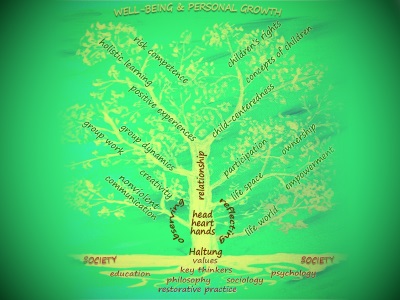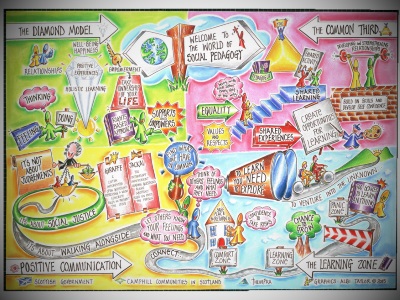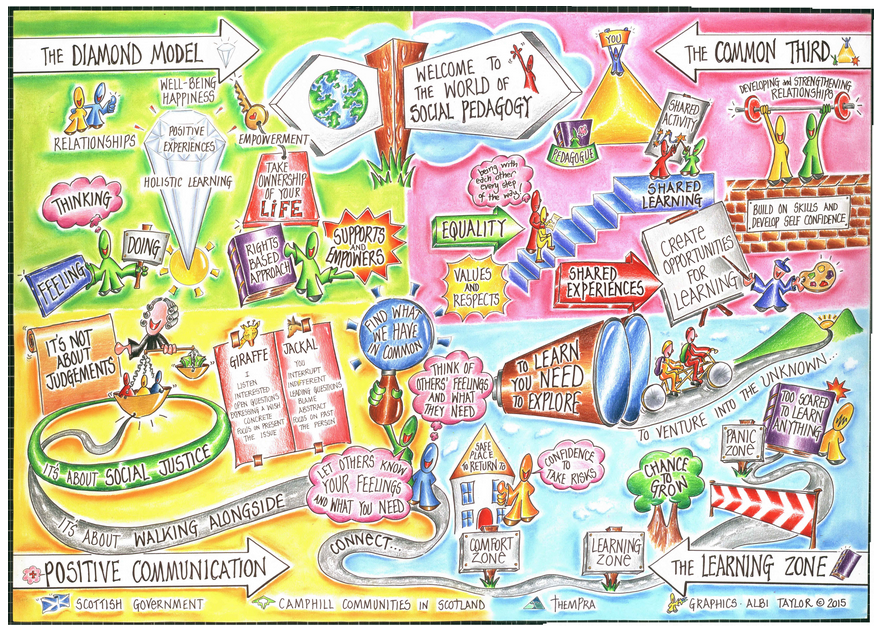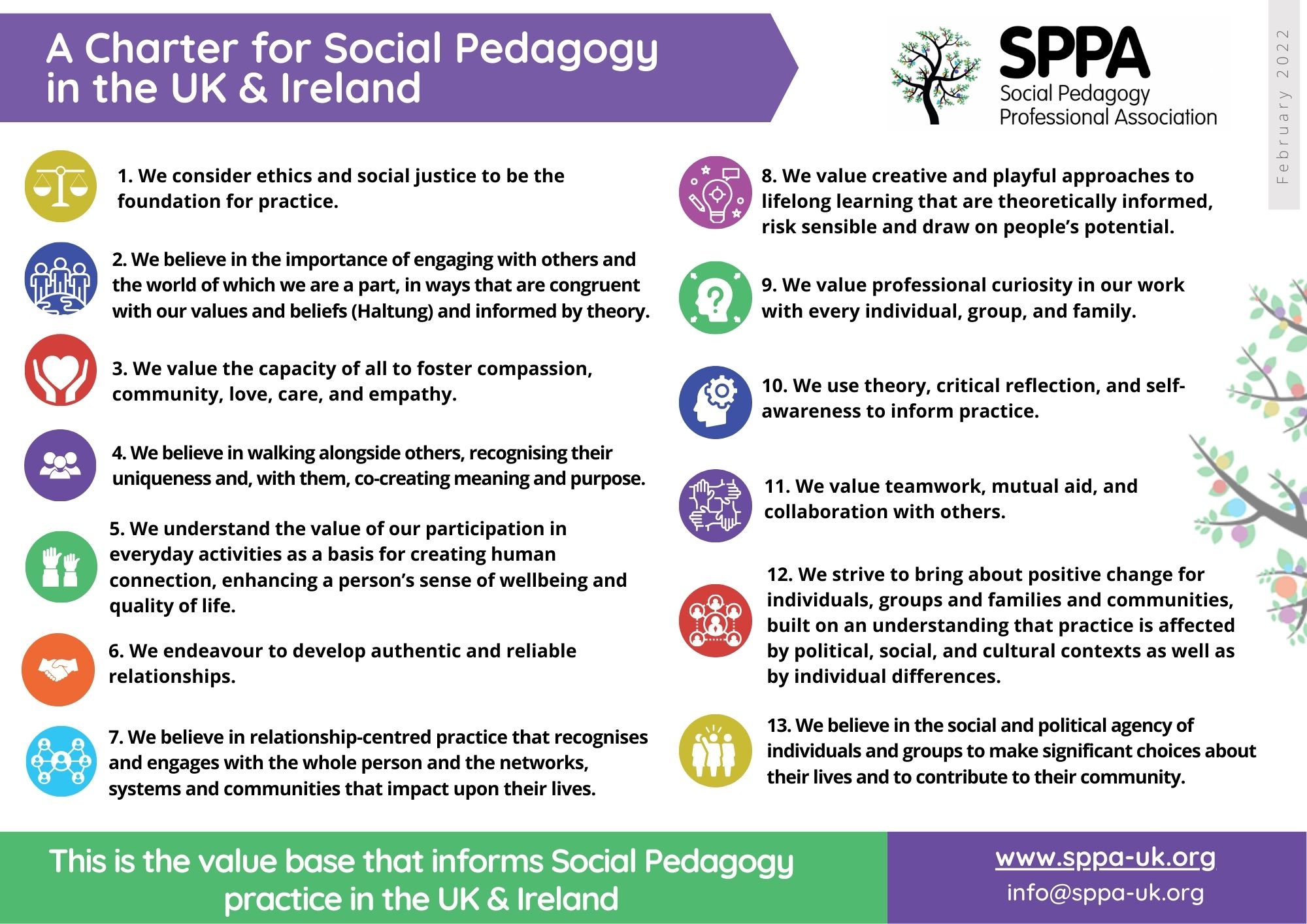What social pedagogy means
Social Pedagogy offers a values-led approach to relationship-centred practice that aims to holistically support people’s well-being, learning and social inclusion. At the heart of Social Pedagogy lies a belief that each person deserves to be treated with human dignity and possesses unique inner resources and potential, which we can help them unfold. To do so requires meaningful and authentic relationships that enable us to recognise a person’s potential, their qualities, strengths and interests, and to create learning situations in which people can experience their resourcefulness and develop new abilities. This is why Social Pedagogy is often translated as education in the broadest sense of the term, with a focus on learning in the ‘everyday’.
In much of continental Europe, and across Latin America, there is a strong tradition of Social Pedagogy as an academic discipline and field of practice across a variety of educational and care settings: from the early years, through to schools, residential child care, play and youth work, community and family support, social work, employment support, addiction work, prisons, support for people with disabilities, and care for the elderly. At first sight, some of these settings may not seem to have much in common. Yet, there is a shared ethical underpinning, an understanding that in any of those settings we can make a positive difference not just for the individuals, but indeed for society as a whole if we create an environment that enhances well-being, supports learning, human growth and social inclusion through empowering relationships. In this sense, Social Pedagogy seeks to find educational solutions to social issues by connecting individuals to society and promoting social justice.
The value of Social Pedagogy lies in the fact that it is more than just an approach to social care and social work practice; it offers a coherent conceptual framework and ethical orientation that strengthens existing practice and enables professionals to navigate challenging and complex situations with a clear sense of purpose and direction. Whilst it can provide professionals with a broad range of methods to use, it ensures that their focus is on the deeper purpose of supporting well-being, learning and social inclusion – and selecting or developing methods that contribute to these aims and seem meaningful within a given practice situation. This is why Social Pedagogy can enhance other current approaches frequently used in UK practice, such as systemic practice, strengths-based, person-centred and risk-sensible models. It is the guiding principle and foundation on which ‘everyday’ practice is built on and influences how professionals then understand and use the approaches mentioned above.
Origins
The term ‘pedagogy’ stems from the Greek terms país (child) and ágõ (to lead, to guide). ‘Social’ pedagogy has grown organically out of a longstanding tradition of educational philosophers, social thinkers and practitioners who were concerned with creating a more just society through educational means. Social pedagogy therefore aims to connect each person to society, with society supporting its most disadvantaged members and each individual taking responsibility for wider society. It aims to create the conditions in which each person can grow and become both more independence and integrated. As this is a lifelong process, social pedagogues work within a range of different settings, from early years through adolescence to working with disadvantaged adult groups as well as older people. Consequently, what exactly social pedagogy means depends very much on the context or setting. Social pedagogues who are working with marginalised adults will draw on other specialisms and theories than social pedagogues working with very young children, but they will be connected through a shared ethos and principles underpinning their social pedagogical orientation.
Social pedagogy is very closely related to society and reflects cultural attitudes and traditions in many ways. It provides clues about how a given society thinks about children’s upbringing, the relationship between the individual and society, and how society supports its disadvantaged or marginalised members. This is why social pedagogy has developed in somewhat different ways across different countries over time – and why a Spanish social pedagogue might explain it in slightly different ways than a Swedish social pedagogue.
Irrespective of the cultural contexts and the different settings in which social pedagogues can work, there are shared underpinning principles: What connects all social pedagogies is the way of thinking, the philosophy and Haltung (congruence between values and actions) with which different methods are used. What characterizes social pedagogy in practice depends not so much on what is done but on how it is done and with what rationale. This means that social pedagogy is both a science and an art form – it’s not just a skill to learn but needs to be brought to life through the social pedagogue’s Haltung.
This perspective of social pedagogy means that it is dynamic, creative, and process-orientated rather than mechanical, procedural, and automated. It demands from social pedagogues to be a whole person, not just a pair of hands. It also offers an insight into how we can develop social pedagogy in the UK: following the same principles, we need to put people at the heart and connect to their Haltung. And we can only construct a social pedagogy for the UK together, in dialogue with each other. Only then can it offer a holistic overarching conceptual framework that can guide professional practice in a meaningful way. And only then can we capture the spirit of social pedagogy which makes it an art, not a method.
Social Pedagogy Charter and Standards
Over the last decade, much effort has gone into developing a clearer understanding of what the principles and practices of social pedagogues and social pedagogy practitioners in the UK are. In 2016, as part of a UCL Institute of Education-led project called Scaling Up Social Pedagogy, we consulted widely with professionals engaged in social pedagogy as practitioners, students, managers, academics or policy-makers to compile Social Pedagogy Standards and develop a charter for social pedagogical practice. The charter and standards are now held by the Social Pedagogy Professional Association.









